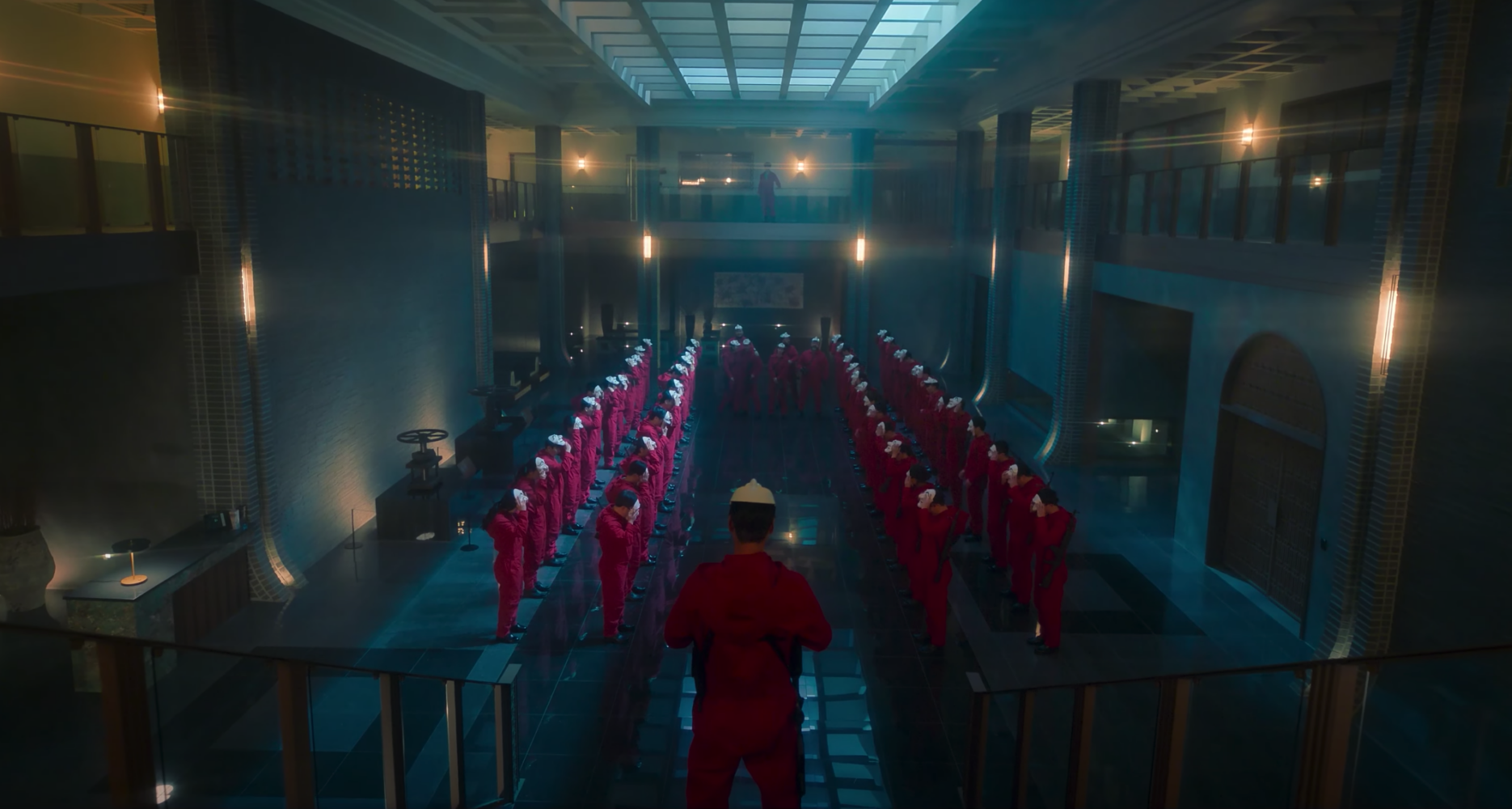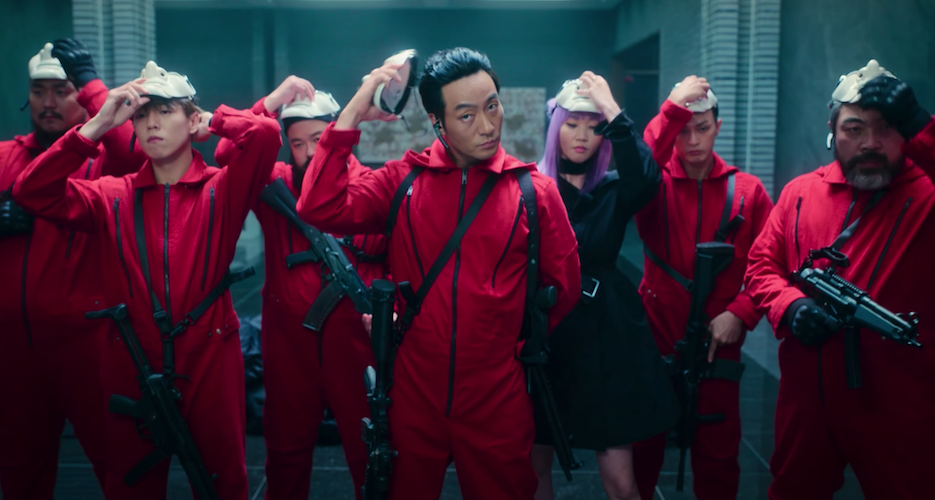New Netflix drama paints dismal picture of road to Korean unification
High crime, exploitation and massive inequality: This is how a new K-drama on Netflix imagines life after North Korea opens its doors to investment and migrants flood the South.
“Money Heist: Korea — Joint Economic Area” is about a group of criminals from both sides of the Demilitarized Zone who siege the inter-Korean mint, created to print money for the North and South’s newly integrated economy only a few years from now.
While many K-dramas and movies take place during the Korean War or deal with North Korea issues, the opening credits of “Money Heist: Korea” give the sense that it’s building from what could have happened if the inter-Korean rapprochement of 2018 didn’t fall through.
Of course, the new drama is just entertainment, not an academic social commentary. But it does contradict the rosy picture of unification the South Korean government often pushes, and more closely reflects the concerns that many younger South Koreans have about the economic and social costs of integrating with their northern brethren.
Note: This article contains spoilers.

‘KOREAN DREAM’ BECOMES NIGHTMARE
The series starts with its protagonist, the Pyongyangite who later adopts the criminal alias Tokyo, dancing through Kim Il Sung Square to the BTS megahit “DNA.”
She’s wearing headphones, of course, a secret member of the BTS “ARMY.” While many North Koreans listen to K-pop, getting caught can land you in prison for five to 15 years.
However, during the protagonist’s mandatory army service, the two Koreas suddenly declare an end to the Korean War, introducing a joint economic area and joint currency. If they get a permit, North Koreans can even travel back and forth to the South.
This isn’t too far-fetched. South Korea’s last president, Moon Jae-in, unsuccessfully pushed to end the Korean War and spoke of a “peace economy,” claiming that the two countries could create a huge market even if they maintained their respective political systems.
Immediately after she’s discharged, Tokyo sets off to the other side of the peninsula to chase what she calls the “Korean Dream.”
But that dream quickly turns into a nightmare. While some grow rich from investment in the DPRK, other South Koreans stage protests over plummeting living standards and skyrocketing crime rates due to mass migration from the North.
In this grim, quasi-unified Korea, Tokyo ends up working as a hostess, making a living being groped by men in seedy karaoke rooms. When a gangster tries to rape her, Tokyo takes his gun, blows his brains out and goes on the run.
Just before she commits suicide out of desperation, a character who goes by the name the Professor finds Tokyo and convinces her to join his heist on the inter-Korean mint.
“When the North opened up, everyone thought they’d cash in on it,” the Professor tells his ragtag team of criminals from both Koreas. “Only the haves got richer. The have-nots, like us, have to find our share of the pie.”
These themes reflect the concerns of South Koreans, especially the younger generation, about what closer ties with the North would mean.
In an annual Seoul National University survey, only 44.6% of respondents in 2021 said that they think North and South need to unify. This was the case across all age groups, but particularly among 19- to 29-year-olds.
Respondents expressed many concerns about unification, with 49.8% saying that it would worsen unemployment, 68.3% that it would increase the gap between rich and poor and 70.4% asserting that crime would become a more serious issue.

The other North Korean member of the Professor’s squad is Berlin. Unlike Tokyo, he is a foul personality with a tragic past who deals with the hostages like a guard at a North Korean prison camp — likely because he spent so much time in one.
A flashback in the middle of the series reveals that, as a young child, Berlin tried to escape the DPRK with his mother. North Korean soldiers opened fire as they tried to swim across the river into China, killing his mother.
After they catch him, Berlin spends the next 25 years of his life in a labor camp. It’s there he turns to violence to survive, which warps him from an innocent child into the most feared inmate in the prison.
According to the U.S. State Department, North Korea holds an estimated 80,000 to 120,000 people in political prison camps and an “undetermined number” of prisoners in other detection facilities.

“Money Heist: Korea” also suggests that North Korean women would pursue romantic relationships with South Korean men to get visas for themselves and their families — or at least that South Korean men would take advantage of women by dangling this in front of them.
Young-min, the South Korean director of the mint, has been stringing along North Korean employee Mi-seon long before they’re taken hostage in the Professor’s bank heist. He promises her that he’ll leave his wife, marry Mi-seon and bring her family to the South.
In order to get Young-min to commit, Mi-seon tells him that she’s pregnant. Young-min knows she’s lying though — he says he’s had a vasectomy.
It does seem that Mi-seon had genuine feelings for Young-min, and perhaps her lies were actually to see if he felt the same way. But Young-min is such a slimy character that it’s difficult to see, apart from his status and ability to get her family to the South, why else Mi-seon would be interested in him.
After they’re both taken hostage, Young-min manipulates Mi-seon’s feelings for him, convincing her to take on the dangerous task of making contact with the outside world.
When Berlin catches her and orders her execution, Young-min does nothing to stand up for her. She actually ends up surviving because her executioner, Denver, can’t go through with it, and the two warm-hearted characters eventually end up falling for each other.

TUNE IN NEXT TIME
However, it’s not all bad feelings between North and South Koreans.
Throughout the drama, Koreans from both sides of the DMZ need to come together to accomplish their goals, whether they be the bank robbers or Pyongyang and Seoul’s joint response unit.
The Professor’s team initially work well together to pull off the bank heist. The divisions within the group actually center around Tokyo and Berlin, the two North Koreans, and the latter’s maverick decision-making.
And while there’s a lot of miscommunication between the heads of the joint response unit, Seoul’s representative threatens to quit when it’s suggested that her North Korean counterpart might be fired.
“Money Heist: Korea” doesn’t shy away from how decades of division and cultural differences would cause friction, but it’s far from a case of “bad” North Koreans victimizing “good” South Koreans, with complex characters who come in varying shades of gray.
While there is little news about part 2, the first installment ends on a cliffhanger.
This leaves many questions begging to be answered. The bank heist supposedly takes place on the eve of an inter-Korean summit that could pave the way for full unification. Will the aftermath of this incident bring the two Koreas together, or keep them apart forever?
It’s hinted in a flashback that the Professor was actually one of the original architects of the inter-Korean economy. As the series’ writer said in a recent interview, it seems that the revolutionary-esque Professor wants to send a strong message about unification through his criminal escapades — but viewers will have to stay tuned to find out what that is.
Edited by Bryan Betts

No comments:
Post a Comment